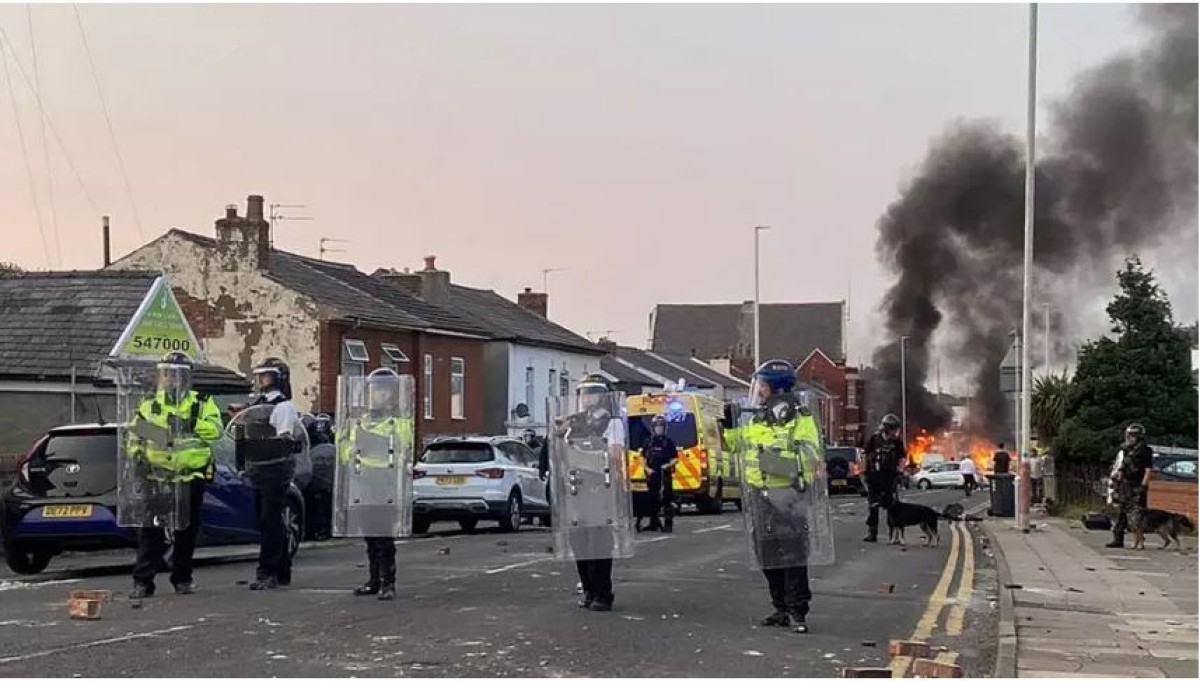 120
120
The United Kingdom on the Brink: Historical Forces Shaping England’s Recent Riots
The United Kingdom on the Brink: Historical Forces Shaping England’s Recent Riots
By: A. Mahdavi
In recent weeks, London streets have been rocked by a surge of street violence and riots against the rising number of foreign immigrants. This unrest has predominantly afflicted England, while Wales and Scotland have largely remained serene. To fully grasp the roots of these disturbances, it is imperative to delve into the historical and socio-political context that shapes contemporary discontent. England, historically the fulcrum of the British Empire, has long served as the epicenter of global influence, forging alliances and shaping key events. This centrality has been accompanied by a deep-seated sense of English exceptionalism and racial superiority.
This ingrained self-perception is starkly reflected in public sentiment, where polls reveal a pervasive nostalgia for a bygone era of national greatness and a prevailing skepticism about the future. In sharp contrast, residents of Wales and Scotland often view the future with optimism, highlighting a growing disillusionment among the English over their diminishing influence within the United Kingdom. The erosion of England’s supremacy as the core of British power has fostered a profound sense of loss and frustration among its people.
This discontent is not merely a matter of cultural pride but signifies a broader struggle to reclaim a perceived diminished status. In this context, Brexit emerges as a bid to reassert England’s global significance, driven by a desire to restore the nation’s erstwhile prominence and influence. The current unrest is further fueled by a “nostalgic longing” for the imperial grandeur of the past, a sentiment embodied by the enduring anthem "Rule, Britannia!" Composed in 1740, this song, a symbol of Britain’s erstwhile imperial might, continues to resonate at cultural and sporting events, underscoring the deep intertwining of English identity with Britain’s historical legacy.
Moreover, the conflation of England with Britain in the national consciousness exacerbates feelings of disenfranchisement. Unlike Scotland, Wales, and Northern Ireland, which possess their own devolved governments, England lacks a similar political structure.
This perceived imbalance has intensified discontent among the English, who feel increasingly marginalized within the broader British framework. Anti-immigration sentiment, while not unique to England, has become a prominent feature of nationalist discourse across various regions. Nevertheless, Scotland and Wales have managed to cultivate more inclusive and progressive narratives that embrace ethnic diversity, in stark contrast to the prevailing English perspective.
The recent violent protests in England represent a significant setback to these forward-looking aspirations. The British government’s response to the riots—focusing predominantly on far-right extremists and framing the violence as a purely criminal issue—fails to address the deeper, underlying problems. While far-right groups have been visibly active, many of the rioters are ordinary English citizens whose grievances are intertwined with broader governmental policies.
A recent YouGov poll reveals that while only 8% of Britons express sympathy with the rioters, 58% support the peaceful demonstrators, indicating widespread frustration with immigration policies perceived as undermining national power. This unrest exposes a profound and deep-seated issue within the United Kingdom, one that demands urgent and nuanced resolution. Without a comprehensive and inclusive approach, the risk of further violence, internal strife, and potential jeopardy to the unity of the United Kingdom looms large. The imperative for thoughtful governance and strategic solutions has never been greater as the nation faces the daunting specter of fragmentation amid its ongoing internal and external challenges.
 120
120
Comment
Post a comment for this article